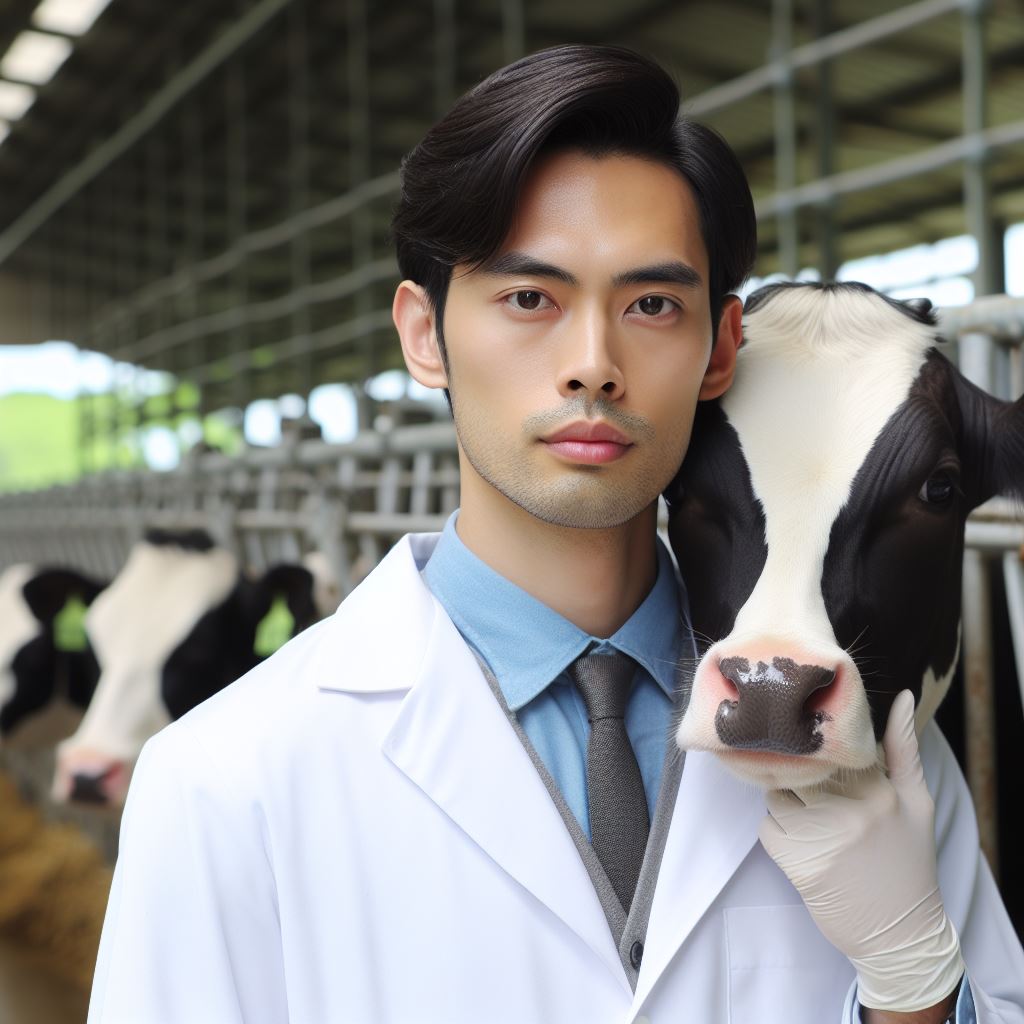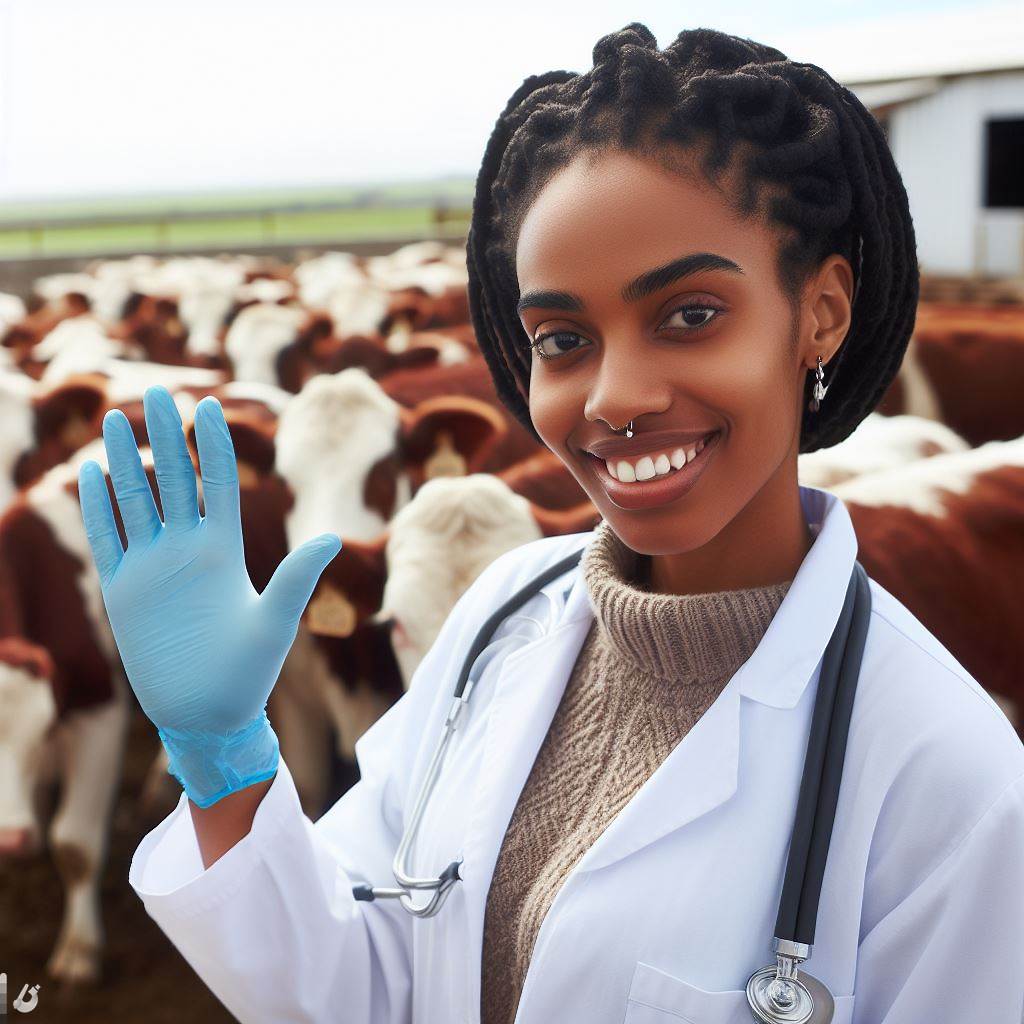Introduction
Maintaining the health of dairy cows is crucial for the success of dairy farms.
Healthy cows produce high-quality milk and are more efficient.
Unfortunately, there are several common diseases that can afflict dairy cows and hinder their productivity.
Overview of Common Diseases in Dairy Cows
- Mastitis: This inflammatory condition of the udder is a significant concern in the dairy industry. It can result from bacteria entering the teat canal, causing pain, swelling, and decreased milk production.
- Lameness: Lameness affects cow mobility and can lead to reduced milk yield and reproductive issues. Common causes include hoof infections, injuries, and poor flooring conditions.
- Metabolic disorders: Conditions like milk fever and ketosis are metabolic disorders that occur around calving. They can be attributed to sudden changes in diet and metabolism, impacting milk production and overall cow health.
- Bovine Respiratory Disease: This respiratory infection affects young and growing cows, causing coughing, nasal discharge, and difficulty breathing. It can lead to reduced weight gain and poor overall performance.
- Reproductive problems: Infertility, dystocia (difficult calving), and retained placenta can decrease reproductive efficiency and impact the profitability of the dairy farm.
Preventing Common Diseases in Dairy Cows
To ensure optimal health, dairy farmers should prioritize preventive measures such as regular vaccination, proper nutrition, maintaining clean bedding and facilities, and providing comfortable and hygienic environments.
Regular veterinary check-ups and prompt treatment of any signs of illness are vital for early detection and prevention of disease spread.
Therefore, prioritizing dairy cow health through preventive measures and prompt treatment of diseases is essential for the success and profitability of dairy farms.
By doing so, farmers can ensure the production of high-quality milk while maintaining the well-being of their cows.
Prevention through Proper Nutrition
In order to maintain the health of dairy cows and prevent common diseases, it is crucial to provide them with a balanced diet.
Proper nutrition is key to their overall well-being and can significantly reduce the risk of various ailments.
Importance of Balanced Diet for Dairy Cows
A well-balanced diet ensures that dairy cows receive all the necessary nutrients to support their bodily functions and maintain optimal health.
It helps enhance their immune system, making them less susceptible to diseases.
By feeding cows a proper diet, their body condition can also be regulated, preventing obesity or malnutrition, which can both compromise their health.
A balanced diet promotes milk production, reproductive efficiency, and longevity.
Specific Nutrients Essential for Maintaining Cow Health
- Protein: Protein is crucial for dairy cows as it supports muscle development, milk production, and the immune system.
- Carbohydrates: Carbs provide energy for bodily functions and milk synthesis.
- Fiber: Adequate fiber intake aids in maintaining a healthy rumen and preventing digestive disorders.
- Fats: Fats are a rich energy source and help maintain body temperature and reproductive functions.
- Minerals and Vitamins: Proper amounts of minerals and vitamins are necessary for various physiological processes and overall health.
- Water: Dairy cows need access to clean and fresh water at all times to stay hydrated and support proper digestion.
Role of Feed Management in Preventing Diseases
Effective feed management plays a crucial role in preventing diseases in dairy cows.
Careful attention should be given to aspects such as feed quality, consistency, and proper feeding techniques.
Transform Your Agribusiness
Unlock your farm's potential with expert advice tailored to your needs. Get actionable steps that drive real results.
Get StartedRegularly assessing the quality of feed ingredients and ensuring they are free from contaminants or toxins is essential to safeguard cow health.
Avoiding moldy or spoiled feed can prevent digestive issues and other health problems.
Consistency in feeding schedules and amounts is also vital.
Abrupt changes in diet can upset the cow’s digestive system, increasing the risk of gastrointestinal disorders.
Gradual transitions should be made when alterations to the diet are necessary.
Proper feeding techniques, such as providing a clean and comfortable feeding environment, can minimize stress on the cows.
Stress can lead to a weakened immune system, making them more susceptible to diseases.
Moreover, maintaining an appropriate feed ration suited to the specific needs of each cow based on factors like age, body condition, and stage of lactation is crucial.
It ensures they receive optimal nutrition without overfeeding or underfeeding.
Most importantly, preventing common diseases in dairy cows is achievable through proper nutrition, emphasizing balanced diets, specific essential nutrients, and effective feed management.
The investment in maintaining the health of dairy cows yields numerous benefits, including increased productivity, improved animal welfare, and reduced veterinarian costs.
Read: Swine Flu: Protecting Your Pig Herds
Regular Veterinary Check-ups
Regular veterinary check-ups are essential in maintaining the health and well-being of dairy cows.
These check-ups play a crucial role in the prevention, early detection, and treatment of common diseases that can impact the productivity and profitability of dairy farming operations.
Importance of Routine Vaccinations and Deworming
Routine vaccinations are crucial for dairy cows as they protect against preventable diseases that can cause severe health complications.
Vaccines stimulate the cow’s immune system, enabling it to produce protective antibodies against specific pathogens.
This immunity helps prevent infection and reduce the severity of any potential diseases.
Routine vaccinations and deworming
Some common vaccines administered to dairy cows include:
- Brucellosis vaccine: Brucellosis is a highly contagious bacterial infection that can cause abortions, reduced milk production, and infertility in cows. Vaccination helps prevent the spread of brucellosis and protects not only the infected cows but also the entire herd and farm employees.
- Mastitis vaccines: Mastitis is a major concern in dairy farming, causing inflammation of the udder and reducing milk quality and quantity. Vaccinating cows against mastitis-causing pathogens, such as Staphylococcus aureus, Streptococcus agalactiae, and Escherichia coli, can significantly reduce the risk of infection and improve udder health.
Deworming is another vital aspect of dairy cow healthcare. Internal parasites, such as roundworms and flukes, can cause digestive disorders, weight loss, anemia, and reduced milk production in cows. Regular deworming treatments ensure that cows are free from these parasites, promoting better overall health.
Early Detection and Treatment of Potential Diseases
Regular veterinary check-ups allow for the early detection and treatment of potential diseases.
Veterinarians are trained to assess the cow’s physical condition, check vital signs, and conduct specialized tests to detect any health abnormalities.
These check-ups help identify diseases such as:
- Bovine Respiratory Disease (BRD): BRD is a common respiratory infection that affects dairy cows, causing coughing, nasal discharge, and difficulty breathing. Early detection allows prompt treatment with antibiotics and supportive care to prevent severe complications.
- Johne’s Disease: Johne’s disease is a chronic bacterial infection that affects the cow’s intestines, leading to weight loss, diarrhea, decreased milk production, and eventual death. Regular check-ups with fecal exams help identify affected cows early, preventing the spread of infection within the herd.
In essence, regular veterinary check-ups are of utmost importance in ensuring the health and well-being of dairy cows.
These check-ups enable farmers to administer routine vaccinations, deworming treatments, and ensure early detection and treatment of potential diseases.
Showcase Your Farming Business
Publish your professional farming services profile on our blog for a one-time fee of $200 and reach a dedicated audience of farmers and agribusiness owners.
Publish Your ProfileBy prioritizing preventive healthcare measures, dairy farmers can maintain a healthy and productive herd, leading to a successful and profitable dairy farming operation.
Read: Sheep Flock Health: Common Illnesses Guide

Maintaining Clean and Comfortable Housing
Importance of clean and well-ventilated barns
Proper housing is essential for maintaining the health and well-being of dairy cows.
Clean and well-ventilated barns play a crucial role in preventing common diseases.
When cows are housed in clean environments, their risk of infection and illness decreases significantly.
A well-ventilated barn allows for proper air circulation, reducing the buildup of moisture and ammonia, which can negatively impact cow health.
Regular cleaning of barns is vital to prevent the accumulation of bacteria and pathogens that can cause diseases in cows.
Manure and other waste materials should be removed promptly to keep the barns clean.
This can be achieved through regular manure management practices, including the removal and proper disposal of manure from the barns.
Strategies for effective manure management
Proper manure management is key to maintaining a clean environment and preventing the spread of diseases.
There are several strategies that can be implemented to effectively manage manure on dairy farms.
One such strategy is regular manure removal, either through manual or mechanical methods.
This ensures that manure does not accumulate and become a breeding ground for pathogens.
Composting is another effective method of manure management.
By composting manure, the temperature increases, killing off harmful bacteria and pathogens.
Composted manure can then be used as a valuable nutrient-rich fertilizer for crops, promoting sustainability on the farm.
Furthermore, ensuring that manure storage areas are properly designed and maintained is essential.
These areas should have adequate lining, proper drainage systems, and regular checks for leaks or potential breaches.
Proper management of manure storage helps prevent contamination of water sources and reduces the risk of disease transmission.
Providing adequate bedding and proper flooring for cow comfort
In addition to cleanliness, cow comfort is crucial in maintaining their health.
Providing adequate bedding and proper flooring can significantly contribute to cow comfort.
Comfortable bedding helps prevent injuries and provides a clean and soft surface for the cows to rest and sleep on.
Straw and sand are commonly used as bedding materials, as they offer good cushioning and absorption properties.
Regularly replenishing bedding and removing soiled bedding is necessary to maintain a clean and comfortable environment for the cows.
Furthermore, proper flooring is essential to prevent lameness and injuries.
Slippery surfaces can cause cows to strain their legs and joints, leading to lameness.
Using rubber mats or grooved flooring provides better traction and reduces the risk of injuries.
Maintaining clean and comfortable housing for dairy cows is essential for their overall health and productivity.
By ensuring clean and well-ventilated barns, implementing effective manure management practices, and providing adequate bedding and proper flooring, farmers can prevent common diseases and promote the well-being of their cows.
Read: Robotics in Poultry Farming: The Future Is Here
Proper Milking and Mastitis Prevention
Maintaining the health of dairy cows should be a top priority for every farmer.
One of the key aspects to focus on is proper milking techniques.
This plays a vital role in preventing common diseases, such as mastitis.
Importance of Proper Milking Techniques
- Ensure cows are milked in a clean and hygienic environment.
- Use sanitized and well-maintained milking equipment to prevent bacterial contamination.
- Avoid overmilking as it can damage the teat ends, making cows more susceptible to infections.
- Maintain a consistent milking routine to stimulate milk let-down and prevent udder engorgement.
- Properly clean and dry the udder before attaching milking cups to avoid introducing pathogens.
By following these techniques, dairy farmers can minimize the risk of mastitis and promote cow health.
Regular Udder Health Checks
- Perform routine udder health checks to detect any abnormalities or early signs of mastitis.
- Check for swelling, heat, or pain in the udder, which may indicate an underlying infection.
- Observe the milk for any changes in color, consistency, or the presence of clots or flakes.
- Keep a record of any cow with repeated mastitis infections for targeted prevention efforts.
- Consult with a veterinarian if any concerns are identified during udder health checks.
Regular udder health checks enable farmers to identify mastitis cases promptly and take immediate action to prevent further spread of infection.
Implementing a Comprehensive Mastitis Prevention Program
- Develop and implement a mastitis prevention program tailored to the farm’s specific needs.
- Nutrition: Provide a well-balanced diet to ensure cows have optimal immunity against mastitis.
- Hygiene: Maintain clean bedding, proper manure management, and adequate ventilation in the barn.
- Treatment: Administer dry cow therapy and treat any infections promptly under veterinary guidance.
- Vaccination: Consider vaccinating cows against common mastitis-causing pathogens to enhance immunity.
- Educate farm personnel on proper milking techniques and hygiene practices.
A comprehensive mastitis prevention program combines different strategies to minimize the risk of infections and maintain cow health.
In fact, proper milking techniques and mastitis prevention are crucial for ensuring the well-being of dairy cows.
By following good milking practices, conducting regular udder health checks, and implementing a comprehensive prevention program, farmers can significantly reduce the incidence of mastitis on their farms.
Read: Advancements in Veterinary Diagnostic Tools
Stress Reduction and Cow Management
Stress plays a significant role in impacting the health of dairy cows.
Showcase Your Farming Business
Publish your professional farming services profile on our blog for a one-time fee of $200 and reach a dedicated audience of farmers and agribusiness owners.
Publish Your ProfileTherefore, implementing strategies to minimize stressors and ensuring effective cow handling techniques are crucial for their well-being.
The Impact of Stress on Cow Health
- Stress can negatively affect the immune system of dairy cows, making them more susceptible to diseases.
- High-stress levels can lead to reduced milk production and reproductive problems in cows.
- Stressed cows may exhibit behavioral changes, such as reduced feed intake and increased aggression.
- Prolonged stress can compromise the overall welfare and longevity of dairy cows.
Strategies for Minimizing Stressors in Dairy Cows
- Provide a comfortable and well-maintained environment with proper ventilation, temperature control, and clean bedding.
- Ensure access to fresh and clean water at all times to prevent dehydration and maintain optimal hydration levels.
- Avoid sudden changes in diet or feeding routines, as this can disrupt the cow’s digestive system and cause stress.
- Minimize noise levels in the barn, as loud noises can startle cows and increase their stress levels.
- Design well-planned handling facilities to reduce unnecessary stress during milking, veterinary procedures, and other routine activities.
- Implement gradual changes when introducing new cows to the herd to reduce social aggression and stress.
- Provide adequate space for cows to move, lie down, and socialize, promoting natural behaviors and reducing stress.
Effective Cow Handling Techniques
- Train dairy farm staff on proper cow handling techniques, including gentle and calm interactions.
- Avoid excessive prodding, hitting, or shouting, as these behaviors can agitate cows and increase stress levels.
- Use low-stress livestock handling methods, such as the “point of balance” concept, to guide cows smoothly without causing fear or distress.
- Maintain consistent routines during milking and handling processes to ensure cows feel more relaxed and secure.
- Observe cow behavior closely and identify signs of stress, such as restlessness, excessive vocalization, or decreased feed intake.
- Implement positive reinforcement techniques, such as rewards or treats, to encourage desirable behaviors and reduce stress during handling and training.
By prioritizing stress reduction and efficient cow management, dairy farmers can significantly improve the health and productivity of their cows.
A stress-free environment and proper handling techniques contribute to happier and healthier dairy cows, ultimately benefiting both the animals and the farmers.
Remember, a happy cow leads to a happy farmer, and a happy farmer leads to high-quality milk production!
Conclusion
The vitality of dairy cow health hinges on proactive strategies.
By prioritizing proper nutrition, maintaining clean environments, ensuring regular veterinary care, and implementing biosecurity measures, farmers fortify the foundation of their dairy operations.
This approach not only safeguards individual cows but also underpins the sustainability and prosperity of the entire dairy farming venture.
The economic stability of the farm is intricately tied to the well-being of each cow, making a proactive stance essential.
Beyond preventing common diseases, this commitment to health resonates with responsible and sustainable dairy farming.
It is an investment in the longevity of the herd and a testament to the farmer’s dedication to fostering a thriving and resilient environment.
As stewards of these animals, farmers play a pivotal role in cultivating a space where dairy cows can flourish, ensuring not only their welfare but also the success of the farm as a whole.
The proactive approach to dairy cow health echoes a commitment to excellence in farming practices and sets the stage for a thriving and sustainable future.




